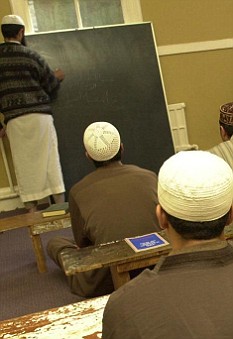|
 Following Asim Siddiqui’s article on the future role of Britain’s madrasahs, Ibrahim Lawson – the head of an Islamic school in London – argues they should not simply hardwire young Muslims into Britain’s consumerist values. Following Asim Siddiqui’s article on the future role of Britain’s madrasahs, Ibrahim Lawson – the head of an Islamic school in London – argues they should not simply hardwire young Muslims into Britain’s consumerist values.
I can understand the logic of Asim Siddiqui’s thinking when he says in his article that madrasahs are disconnected from the real world and have failed to nurture the full potential of the children that attend them.
Within his assumed terms of reference, it makes sense. I wonder though if there is not another perspective on this issue of social exclusion of Muslims.
Firstly, though, let me make it clear that I am embarrassingly white, male, middle class and middle aged. I do not have the right to comment on this issue any more than on, say, feminism or Prince Charles’ marriage to Lady Di. There is a kind of arrogance in imagining I can tell people what to think when I have no existential grasp of how they interpret themselves and the world.
That said, I don’t mind expressing an opinion as an artistic gesture, neither suggesting truth nor falsity but only kind of colourful perspective.
The question is: should being a part of this society as it is, be the focus of our aspirations?
Asim’s vision of professional and aspirational training is one way to go, but I think we can do more than just focusing on “skills essential for success in the modern workplace”.
The idea of joining up the traditional mosque-based madrasah system with the skills of the upwardly-mobile middle class professionals is certainly a start, but what’s the vision? It seems uncomfortably like a politely Islamised version of my parents’ middle class secular materialism.
Perhaps it’s a step in the right direction; or perhaps it’s opting for the blue pill.
So what more could the mosques and madrasahs be doing with all that time they have with children, most of which is probably being wasted? What kind of aspirations might we be thinking of, that go beyond the limitations of learning to read (though not understand) Qur’an or becoming a successfully functioning cog in the British state machine?
Not that there’s anything wrong with either of these as far as they go, but it may not be enough to create some middle ground between the poor and excluded underclass and the relatively comfortably middle class who have ‘succeeded’ in society’s terms. It may be that for Muslim, society’s terms need to change.
What I have always thought the madrasahs should also be doing is redefining the rather narrow learning process outlined by British state education - rather than label themselves “winners” or “losers” within that cultural worldview.
Of course this need not preclude learning how to take advantage of opportunities offered by western society; but the society of the future that I envisage will not be one in which everyone has, marvellously, wonderfully, become a comfortably integrated consumer, “plugged into mainstream society”. That was my parents’ vision, and the bills are still coming in.
What would this mean in practice? Well that’s something that will emerge and there is no one definitive outcome, though breaking down outmoded cultural prejudices is certainly a prerequisite.
One possibility is a focus on environmental preservation with its direct link to our madly disproportionate consumption of natural resources and the usury driven economic system which has produced it. Next stop – boycott IKEA, that’ll be the real test!
Ibrahim Lawson is a shura member of the Association of Muslim Schools and the head of Al-Risalah, an Islamic school in London.
|





 Following Asim Siddiqui’s
Following Asim Siddiqui’s 